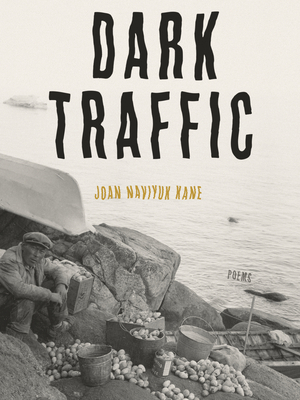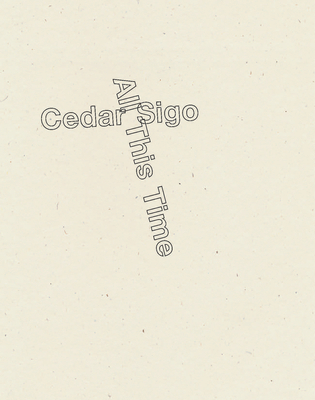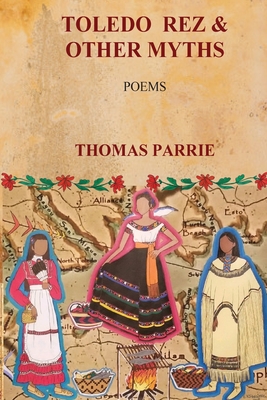Three Native American Poets
Dark Traffic
Joan Naviyuk Kane
University of Pittsburgh Press ($18)
All This Time
Cedar Sigo
Wave Books ($18)
Toledo Rez & Other Myths
Thomas Parrie
That Painted Horse Press: A Borderless Indigenous Press of the Americas ($20)
by Nancy Beauregard
In Joan Naviyuk Kane’s latest collection, Dark Traffic, the poet addresses the brutality of colonization and its effects on language, culture, ancestral lands, and way of life for her Inupiaq people and family from Ugiuvak (King Island) and Qawiaraq (Mary’s Igloo), Alaska. Kane’s lyrical and often haunting poetry evokes both a feeling of despair for what was lost and a consistent theme of the resilience of a people fighting to keep their traditional ways of life, even after circumstances forced many of them to relocate to the mainland of Alaska.
In the opening poem, “Rookeries,” Kane depicts “the bicornuate woman” surviving in a world that rapidly changes with colonization:
The moon pronounced with clarity
its known topography. Our letters
and lists, reconstructed grammars:
they replace the ways in which we were
grabbed, and pushed, then shoved.
Set a wife and her children
to rove with indefinite orders.
Evident in these lines is a sense of finality, as if the natural world has the final say on what will be. This sense is confirmed in the last lines of the poem, where Kane writes,
Of those men,
we knew I could never do
them any good. In this way
I forget, and let the wind
river. It gales and tears
at my shoulders and wrists.
These beautifully enjambed couplets create an image of movement in the reader’s mind, with the word “river” becoming a verb to transport memory to the narrator.
In the title poem, “Dark Traffic,” Kane’s rich diction evokes images of water and never-ending wind in which the ocean is constantly changing. The opening lines warn of an impending crisis: “Before it ceases, the ice collapses easily, / There is no day without a symptom.” Ghostly movements take us up one side of a wave and back down the other side to fight for breath before we drown: “There is nothing but the wind, a howl / and dive where water is thrown // over water and sown into it.” There is an urgency in this poem—a warning that must be heeded if we are to survive as snow melts and ice cracks.
Several poems crisscross this collection like a tightly woven braid of history. “White Alice,” for example, focuses on a telecommunication system installed by the military in several remote areas of Alaska during the Cold War. After being replaced with satellite communication, they were abandoned and became areas of contamination. Most standing structures were eventually removed due to environmental and health issues. In the collection’s final “White Alice” poem, titled “White Alice Changes,” the poet asks questions that require answers and accountability: “Was there once a live, green tree? / White Alice, will you look at me? // White Alice, why would you come back?”
All This Time by Cedar Sigo, who grew up on the Suquamish reservation in the Pacific Northwest, is one of several collections of his that explore language in a first-person perspective. Themes include the process of writing, revising, and seeing beauty in everything, including the ordinary. The book’s introductory poem, “On Distortion,” offers advice to both reader and writer: “(Welcome everything in).” This first line gives permission to let the mind wander, to take a breath and to play with words found on the page. Sigo explains how paper during the civil war was scarce and “cross-writing,” where letters were turned so sentences could continue between previously written lines, became distorted language:
When the words do
not resolve but clank and die next to
each other. Arbitrary actions leveled at
flagstones in architecture, resetting our
margins after the poem has already been
typed into “emotional” paragraphs. A
hovering form of distortion.
In the final lines of the poem, the poet describes how he does not let such distortions affect his own work:
I make
endless destroyed works as they will
become the best poetry, exquisite, half
forgotten, a torn tissue, four to eight
specks of unequal green.
Sigo dedicates many of his poems to writers who have inspired him, as in “November 19, 2016” for Joanne Kyger, with whom he studied at the Naropa Institute in 1995. Words flow down the page like rain that might glaze William Carlos Williams’ wheelbarrow:
Poetry is the part
that no one sees
clip the flower
burn the brush
watch rain stream
down
the moon-viewing
window
six drops fold together
then glimmer
The imagery of rain folding and glimmering, combined with the sparse form, feels comfortable and quiet, as if the poem is creating a place for the reader to sit and observe. In another poem in the collection “Solarium,” Sigo does the opposite by breaking that quiet with a glimpse into the writer’s mind. He emphasizes how poems are not easily created on the page: “sometimes / writing is waiting for / a panel of clouded / glass to come clean.”
Toledo Rez & Other Myths by Thomas Parrie, who is affiliated with the Choctaw-Apache Tribe of Ebarb located in west Louisiana, is full of cultural storytelling handed down from father to son. This debut collection, as Parrie puts it, “is about displacement in body and in soul. It is about reclaiming what has been taken, what has been denied, whether it was land, language, or tradition, or all the above.” It is also about creating work that will dance the reader across the page.
One of the standout poems in this collection combines reality with myth. “Sasquatch Woman” follows a woman who is convinced she raised Bigfoot from a baby:
Even on her deathbed,
she claimed finding her baby
Bigfoot in ’64 and nursing
him back to health.
She fed him tomatoes.
He loved chasing egrets.
Although playful at first, as the poem goes on it becomes heartbreaking to realize that people did not believe this elder. The closing lines ask us what stories we choose to believe:
When she got too old, she
was moved to a home where
she told nurses angels sat with her
at night, she could hear her ancestors
singing while she slept, and her baby
bigfoot watched over her
through her third floor window.
Parrie is a deft practitioner of the prose poem as well. In “The Story of Two Lost Indians,” a chief helps two people lost in the woods find their way back to civilization. He invites them into his home: “When he saw their baggy clothes, he gave them tobacco. When he saw their dry mouths, he showed them pictures of his ancestors.” The poem speaks of ceremony, as the chief gives one of the wanderers his son’s Vietnam Service Medal; the other, sage to be split in half for each of them. “He then led them out,” Parrie writes, “and as they entered the forest, the chief began to sing and shake his gourds. Later, the two lost Indians threw away the sage and traded the medal for Spam and Evan Williams.”
In the collection’s final poem, “Toledo Rez,” Parrie explains the displacement, survival, and adaption his tribal community experienced after the Sabine River was dammed and ancestral grounds flooded to turn Toledo Lake into a reservoir to power a hydroelectric plant:
Roofs of houses jut out
of lake as shards
where Indians, turned to fish, dance
in its belly like prize winning bass.
Indians dancing down there
have a brownness that hangs from
their bones like sacks of loot and corn,
like tamales and welfare, like whiskey
and crosses, and my grandmothers’
feet pounding mud dancing
and swim through hollowed out cars
and trucks of flooded junkyard forests
of my ancestors.
Parrie closes the poem by asking us to think about what history books do not tell us—how we need to wake up and listen to the real stories being told. He writes,
There’s blood in the mud from the changing.
Over time, it will harden into clay;
a shard of pottery to prove
we were here at all.
This final stanza cleverly brings the reader back around to the book’s epigraph: “What was left behind still sits at the bottom of the lake.”
Click here to purchase Dark Traffic at your local independent bookstore:
Click here to purchase All This Time at your local independent bookstore:
Click here to purchase Toledo Rez & Other Myths at your local independent bookstore:
Rain Taxi Online Edition Fall 2022 | © Rain Taxi, Inc. 2022




